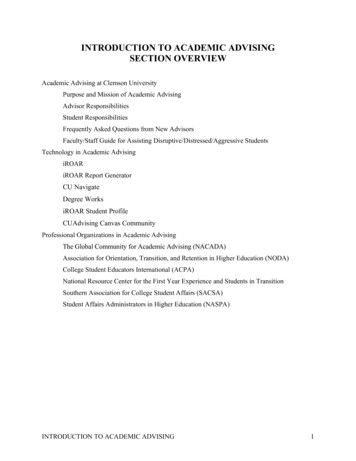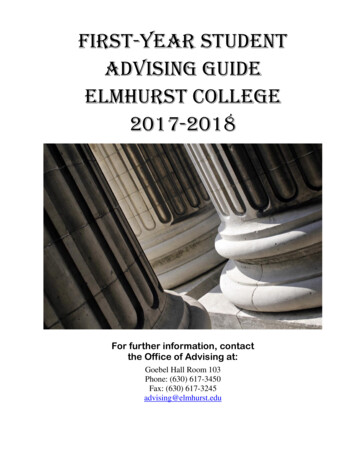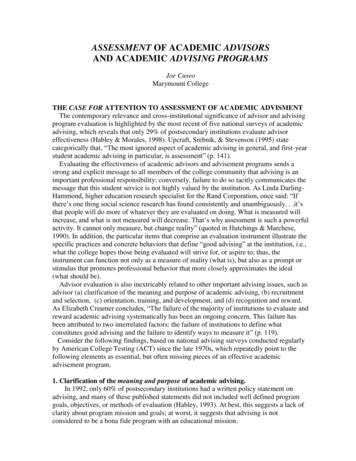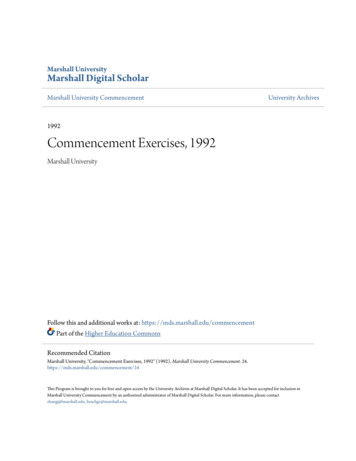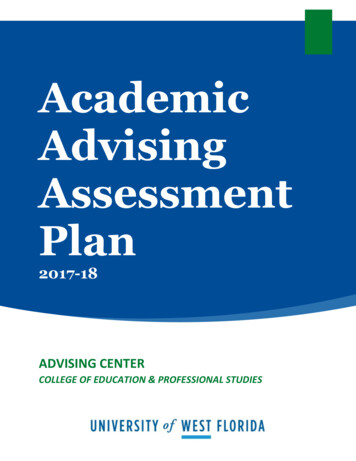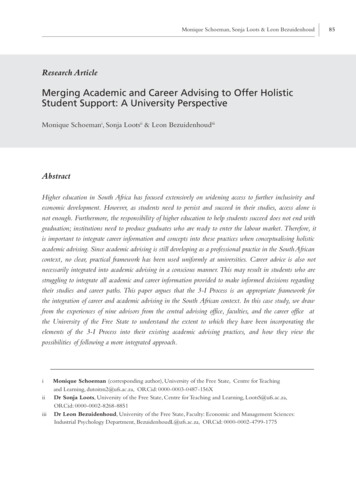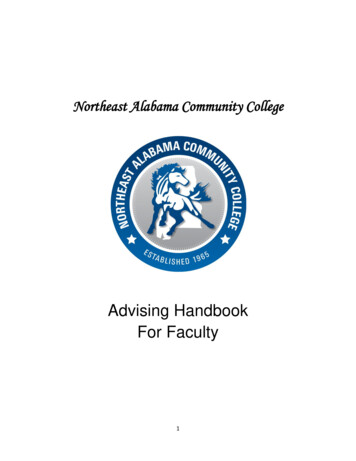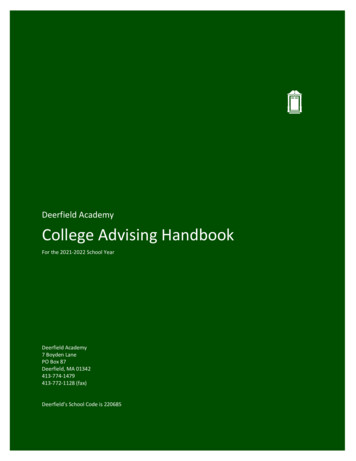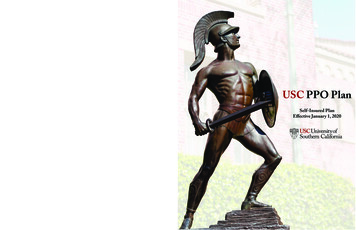
Transcription
Academic Advising SyllabusLocation: Jill and Frank Fertitta Hall– JFF 201Email: undergrad.advising@marshall.usc.edu Phone: (213) 740-0690Website: g/Facebook: https://www.facebook.com/marshallugadvise Twitter: http://twitter.com/MarshallUGAMissionThe mission of the Office of Undergraduate Advising is to support the education and development ofundergraduate students in USC’s Marshall School of Business by providing a broad array of academicsupport and co-curricular programs and services, including but not limited to advisement. Aseducators, we seek to foster a dynamic partnership with students as they actively participate with usin creating and refining their academic goals and plans. Advisors strive to be courteous,knowledgeable, and informative as we empower students to develop holistically.What is Academic Advising?Academic Advising is the on-going process throughout college of clarifying and re-evaluating ofacademic goals and plans. It helps you to examine your personal, educational, and career goals,and to understand how your courses fit into your goals for the future. Most importantly, it requiresactive participation between advisor AND student. Advising is mandatory in your first two semestersat USC and/or until you have earned 24 units at USC. Your academic advisor is here to guide youthroughout your time at Marshall, but completing your degree requirements is ultimately YOURresponsibility.Office Hours: Our office is open Monday-Friday 8:30AM-5:00PM.Making an AppointmentTo schedule an appointment, please call our front desk at (213) 740-0690 or stop by JFF 201 duringbusiness hours. Appointments are typically 30 minutes in length, except during the first week of theterm and during registration.Drop-in HoursDuring the academic year, drop-in advising is available Monday through Thursday from 3pm to 4pmin JFF 201. Stop by for answers to quick 5 to 10 minute questions. If your assigned advisor is notavailable during drop-in hours, other advisors will be available to answer your questions. Please notethat drop-in hours may change during registration and school breaks. Be sure to check our websitefor current hours.Contacting your Advisor via EmailWhen emailing your advisor remember to include your first and last name and your USC student ID number.Unless your advisor is out of the office, he or she will typically respond within two business days. Here is asample email for contacting your academic advisor:Dear Ms./Mr. Advisor,My name is Tommy Trojan. I am writing because I misplaced my course plan we did in our appointment lastweek. Can you please email it to me? Thank you.Tammy TrojanID: 0123456789
Advisor and Student Roles and Responsibilities in Academic AdvisingAdvisor Role:listen and guide, challenge and supportStudent Role:learn and grow, take responsibilityBe available to you through scheduledappointments, drop-in hours, group advisingsessions, and emails during regular business hours.Understand that advisors have a variety ofresponsibilities that impact their availability. Keepscheduled appointments or cancel with 24 hours’notice.Assist with course planning.Attend mandatory advising and schedule regularadvising meetings in a timely fashion. Register forcourses on time.Help you develop, clarify, & modify academicgoals.Review Student Academic Record System Report(STARS) & course plans.Inform you about campus activities &opportunities.Read & respond to USC email & be open toopportunities outside of the classroom.Clarify school policies & procedures.Be aware of important dates & deadlines.Listen, ask questions & respect you as an individual.Be prepared, ask questions, and be accountable.Respect your advisor as a professional who has yourbest interest in mind.Discuss your academic performance and itsimpact on your future goals.Take responsibility for your academic performanceand accept the challenges that college coursesprovide.Adhere to confidentiality guidelines as outlined inthe Family Educational Rights and Privacy Act(FERPA)Keep open lines of communication. Share problems &concerns.Refer you to campus resources.Follow-up with recommended referrals.Student Learning OutcomesAs a result of actively participating in academic advisement, you can expect to: Understand the USC General Education (GE) requirements and Marshall School of Business curriculum. Understand how the courses in your major (and minor, if applicable) fit together and relate to your overallintellectual growth. Correctly interpret the information on your STARS report and apply the information on your STARS report toappropriate course selection. Understand how to complete degree requirements and develop a plan for timely completion of degree. Identify, clarify, and articulate your personal, educational, and career values and goals. Relate your values and goals to their selection of careers, majors and courses. Relate your career exploration to their skills, values, interests, and major(s). Identify your strengths and areas in need of strengthening. Identify campus resources that help you reach your goals. Understand the academic policies and procedures at USC.
Statement on Academic IntegrityUSC seeks to maintain an optimal learning environment. General principles of academic honesty include theconcept of respect for the intellectual property of others, the expectation that individual work will be submittedunless otherwise allowed by an instructor and the obligations both to protect one’s own academic work frommisuse by others, as well as, to avoid using another’s work as one’s own. All students are expected to understandand abide by these principles. SCampus, the Student Guidebook, contains the Student Conduct Code in Section11.00, while the recommended sanctions are located in Appendix A or on our Office of Student Judicial Affairs andCommunity Standards (SJACS) website: ources/resources.html.Students will be referred to the Office of Student Judicial Affairs and Community Standards for further review, shouldthere be any suspicion of academic dishonesty. The Review process can be found at: http://usc.edu/studentaffairs/SJACS/. To learn more about Academic Integrity please complete the Academic Integrity nce/tutorials/academic integrity/index.phpStatement for Students with DisabilitiesAny student requesting academic accommodations based on disability is required to register with Disability Servicesand Programs (DSP) each semester. A letter of verification for approved accommodations can be obtained fromDSP. Please be sure the letter is delivered to your professors as early in the semester as possible. DSP is located in STU301 and is open 8:30am – 5:00pm, Monday through Friday. The phone number for DSP is (213) 740-0776 and thewebsite is: www.usc.edu/disability.University Terms1. ALUMNI — those graduated from the institution.2. BLACKBOARD — An electronic course managementsystem that allows students to access course materialonline. Both traditional and online classes utilize theBlackboard system.3. CODE OF CONDUCT — Statements of expectedconduct of all USC students, which is found in theStudent SCampus. Students who register at USC agreeto abide by its regulations and policies. Violation ofthe Code of Conduct may subject students todisciplinary action.4. CO-REQUISITE — A course that must be taken priorto or in conjunction with another course.5. CURRICULUM — The prescribed classes in a programof study needed to complete a degree at a giveninstitution.6. D-CLEARANCE— Short for Department Clearance,these classes require additional permission in order foryou to register.10. OASIS — Portal to your USC academic records(found at www.my.usc.edu)11. PART-TIME — A student enrolled in fewer than 12semester units.12. PERMIT TO REGISTER — The date and time wheneligible students can begin registering for classes(found under OASIS at www.my.usc.edu).13. PRE-REQUISITE — A course which must besuccessfully completed before the student mayenroll in a particular class.14. REGISTRATION — The act of enrolling in classes fora semester. Students register online using WebRegistration.15. STARS REPORT — Detailed list of your degreerequirements that have been met and/or remainunfulfilled.7. FULL-TIME — A student enrolled in 12 or moresemester units.16. SYLLABUS — An outline of the importantinformation about a course. Written by the professoror instructor, it usually includes important dates,assignments, expectations and policies specific tothat course.8. MAJOR — The academic area in which studentschoose to study/pursue a degree.17. TRANSFER CREDIT REPORT (TCR) — credit grantedfor transfer courses and exams (AP, IB, etc.)9. MIDTERM — An exam given in the middle of thesemester to test students on material covered in thefirst part of the semester.
Academic Calendar - RemindersFALL 2016Late AugustSeptemberOctober Review your STARS report to make sure your AP and transfer credits are recorded. Attend the New Student Welcome and the Student Involvement Fair. Review your classes’ syllabi and mark your calendars with major test and quizdates. If you have questions about your classes, ask your advisor or your professor. Be sureto make changes to your schedule if you needed. You have three weeks to setyour schedule for the fall semester. The add/drop deadline for most classes isFriday of third week. Begin going to tutoring. Think about an academic goal you would like to accomplish this semester. Whatsteps do you need to take now to achieve it? What obstacles may be preventingyou from reaching that goal? What resources can help you to reach your goal? Attend a Marshall Connections Program (MCP) event such as a Meal with aFaculty Mentor, the MCP Academic & Career Connections Series, or CareerServices 101. Sign-up for connectSC and the Marshall Career Source. Freshmen: Attend a LINC information session and apply for a spring LINC trip. Transfer Students: Attend a TIE information session and submit your application. Attend another MCP event.Attend tutoring regularly.Visit a professor in office hours.Prepare for midterms. How are your classes going? Did you get a “midterm gradeat risk” email? Be sure to check in with your professors regarding your status in yourclasses. If you are struggling and need help, be sure to communicate with youradvisor so he or she can refer you to the proper resources on campus.Schedule an appointment with your advisor to discuss your spring semesterschedule.Freshmen: Sign up for a LINC or GLP trip for the spring.Transfer Students: Review upcoming Excel trips and consider applying.Visit the USC Career CenterNovember Last day to withdraw from a class with a mark of ‘W’ is Friday of the 12 th week. Besure to ask for help if you are struggling with your classes. Have you beenattending tutoring regularly? Have you visited your professors’ office hours? Meet with your advisor about spring registration if you didn’t already do so inOctober. Review the schedule of classes and start to plan a mock schedule forthe spring. Log into Online Academic Student Information System (OASIS) andcheck for your “permit to register” so you know the date and time you canregister. Make sure you do not have any holds that will prevent you fromregistering. Be sure to register on time!Early December Prepare for finals. Form a study group! Students who study in groups often dobetter than those who study alone. Celebrate the successful completion of your first semester at USC!Winter Break Start thinking about the summer. Do you want an internship? Talk with someoneyou respect, admire, and trust about his or her career decision-making process.What can you learn from this person? What might you do differently?
Academic Calendar - RemindersSPRING 2017January Most students start each semester with plans for how “this semester will bedifferent.” How do you hope to improve upon last semester? List some techniquesyou might use to help you become an even better student. What resources mightyou make use of? How might you spend your time differently? Check in with youradvisor regarding any questions or concerns. Review your classes’ syllabi and mark your calendars with major test and quizdates. If you have questions about your classes, be sure to ask your advisor or yourprofessor. Be sure to make changes to your schedule if needed. You have threeweeks to set your schedule for the spring semester. Check your STARS report to make sure your academic progress is accuratelyreported. Let your advisor know if there are any discrepancies. Attend an MCP event such as an Academic and Career Connections workshop ora Meal with a Faculty Mentor. Attend Career Fest and Career Fair.February Attend another MCP event such as a Meal with a Faculty Mentor. Visit the USC Career Center to learn about all the career related resourcesavailable to you on campus. Did you receive any “mid-term grade at risk” emails? Be sure to check in with yourprofessors and your advisor to ensure you are aware of the resources available tohelp you succeed. Check out Career Fest events and take advantage of Internship Week. Visit a professor during office hours.March Check the Schedule of Classes for both summer and fall. Start to draft a mockschedule for fall. Check in with your advisor if you want to update your courseplan or are having trouble in your classes. Freshmen: Participate in spring break GLP or LINC trip. Reflect on your experiencesand what you learned about international business.April The 12th Friday of the semester is the final day to withdraw from class from mostclasses with a mark of a “W.” Check OASIS for your permit to register and any holds that may prevent you fromregistering. Meet with your advisor to discuss your fall courses. Apply for a Marshall scholarship.May and beyond: Prepare for finals. Study hard for exams, try a study group or attend review sessions. Volunteer to help with commencement. Freshmen: Participate in a May LINC trip if you have not traveled in March.Reflect on your experiences and what you learned. Taking summer school outside of USC? Make sure you have pre-approval viaOASIS. Celebrate a successful end to your first year at USC! Use your summer to explore career development opportunities.
Student ResourcesOASIS- find yours STARS report, permit to register, holds preventing you from registration and other personal studentinformation: https://camel2.usc.edu/OASIS/Login.aspxSchedule of Classes- Course schedule information and registration deadlines and policies.http://web-app.usc.edu/soc/Marshall Undergraduate Advising website- all you need to know regarding upcoming events, how to contact peermentors, forms and sample course dvising/Marshall Connections Program - a series of activities designed for first-year freshmen and transfer students at theMarshall School of Business. MCP activities happen throughout the academic year and include programs such asworkshops, meals with faculty, and networking events. Students will have the opportunity to establish connectionswith fellow Marshall students, faculty, staff and alumni.Marshall Peer Tutoring Program- Get help with ECON 351, ECON 352, BUAD 306, BUAD 310, BUAD ring-program/Kortschak Center- Do you learn in different ways and need a creative way to approach your academic work?Check out this center especially designed for you! http://kortschakcenter.usc.edu/USC Counseling Services – For a broad range of support services, including individual and group Disability Services & Programs- Have a documented visible or invisible disability? Visit this website and center for howto register your disability and receive the support you need while you are at rams/dsp/home index.htmlMath Center- Are you struggling with Calculus or pre-calculus? Come by the Math Center to study and have yourquestions answered. http://dornsife.usc.edu/mathcenter/welcome/Writing Center- Are you struggling to get used to college level writing? Get feedback and assistance at the WritingCenter. http://dornsife.usc.edu/writingcenter/Marshall International Programs- tional-programs/Campus Activities- Want to join a club or meet new people? Campus activities can help you find something funand free to do on a Friday night. http://sait.usc.edu/ca/Marshall Student Organizations- hip-development/studentorganizations/USC Career Center - Do you know how to set up a resume or write a cover letter? What about tips on interviewingand networking? Do you need help finding a job or internship? They offer students all that and more for free!http://careers.usc.edu/Marshall Career Development Programs- services/Marshall CareerSource- An online listing of timely job leads for full-time and internship positions specifically targetedto USC Marshall undergraduate business and accounting students. http://www.marshallcareersource.com/Choosing a Minor – a good resource to get you started: http://undergrad.usc.edu/programs/minor/For more information, frequently-asked advising questions, and a list of more ad/advising
Academic Advising is the on-going process throughout college of clarifying and re-evaluating of academic goals and plans. It helps you to examine your personal, educational, and career goals, . University Terms 10. OASIS — Portal to your USC academic records (found at www.my.usc.edu) 11. PART-TIME — A student enrolled in fewer than 12 .
